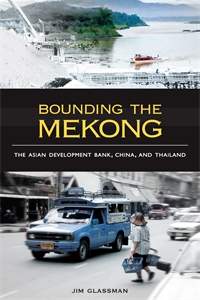Bounding the Mekong: The Asian Development Bank, China, and Thailand
- About the Book
-
Transnational economic integration has been described by globalization boosters as a rising tide that will lift all boats, an opportunity for all participants to achieve greater prosperity through a combination of political cooperation and capitalist economic competition. The Asian Development Bank (ADB) has championed such rhetoric in promoting the integration of China, Southeast Asia’s formerly socialist states, and Thailand into a regional project called the Greater Mekong Subregion (GMS). But while the GMS project is in fact hastening regional economic integration, Jim Glassman shows that the approach belies the ADB’s idealized description of “win-win” outcomes. The process of “actually existing globalization” in the GMS does provide varied opportunities for different actors, but it is less a rising tide that lifts all boats than an uneven flood of transnational capitalist development whose outcomes are determined by intense class struggles, market competition, and regulatory battles.
Glassman makes the case for adopting a class-based approach to analysis of GMS development, regionalization, and actually existing globalization. First he analyzes the interests and actions of various Thai participants in GMS development, then the roles of different Chinese actors in GMS integration. He next provides two cases illustrating the serious limits of any notion that GMS integration is a relatively egalitarian process—Laos’ participation in GMS development and the role of migrant Burmese workers in the production of the GMS. He finds that Burmese migrant workers, dam-displaced Chinese and Laotian villagers, and economically-stressed Thai farmers and small businesses are relative “losers” compared to the powerful business interests that shape GMS integration from locations like Bangkok and Kunming, as well as key sites outside the GMS like Beijing, Singapore, and Tokyo. The final chapter blends geographical-historical analysis with an assessment of uneven development and actually existing globalization in the GMS.
Cogent and persuasive, Bounding the Mekong will attract attention from the growing number of scholars analyzing globalization, neoliberalism, regionalization, and multiple scales of governance. It is suitable for graduate courses in geography, political science, and sociology as well as courses with a regional focus.
- About the Author(s)
-
Jim Glassman, Author
- Reviews and Endorsements
-
- "Jim Glassman has written a well researched book on the economic, political and socio-cultural integration of the Greater Mekong Subregion (GMS)." - Pavin Chachavalpongpun, ASEAN Studies Centre, Institute of Southeast Asian Studies (Vol 28:No 1) (April 2011) "Glassman innovatively demonstrates that recognizing the dynamics of class and consequent uneven development allows for a more realistic view of the outcomes of globalization, in both the present and the future. Summing Up: Recommended" - S.J. Gabriel, Mount Holyoke College, CHOICE (Vol 48:No 07) (March 2011) "Bounding the Mekong is a rich combination of raw data interwoven with excellent narration and backed by a firm theorectical analysis." - William Noseworthy, New Asia Books (April 2015) "This book provides a powerful expose of the hollowness of much of the mainstream institutional discourse on free markets and region-making, as well as the ideological underpinnings of the agendas of the Asian Development Bank and the naturalizing discourse that sees states and regulation as somehow an aberration. Glassman’s analysis is highly original and brings a fresh approach to a region about which a lot has been written in recent years. The theoretical underpinning of the scholarship is more than just sound—it is a tour de force. The book fills an important niche in bringing well theorized analysis to a specifically contextualized region." —Philip Hirsch, University of Sydney"Bounding the Mekong is a cogent and persuasive class-based analysis of the Asian Development Bank’s Greater Mekong Subregion Project. The book presents an innovative and original perspective that should attract attention and generate debate among the growing number of scholars analyzing globalization, neoliberalism, and regionalization. Accessibly written, the book is suitable for upper division and graduate courses in geography, political science, and sociology as well as courses with a regional focus." —Janet Sturgeon, author of Border Landscapes: The Politics of Akha Land Use in China and Thailand
—http://www.uhpress.hawaii.edu/p-6704-9780824834449.aspx
- "Jim Glassman has written a well researched book on the economic, political and socio-cultural integration of the Greater Mekong Subregion (GMS)." - Pavin Chachavalpongpun, ASEAN Studies Centre, Institute of Southeast Asian Studies (Vol 28:No 1) (April 2011) "Glassman innovatively demonstrates that recognizing the dynamics of class and consequent uneven development allows for a more realistic view of the outcomes of globalization, in both the present and the future. Summing Up: Recommended" - S.J. Gabriel, Mount Holyoke College, CHOICE (Vol 48:No 07) (March 2011) "Bounding the Mekong is a rich combination of raw data interwoven with excellent narration and backed by a firm theorectical analysis." - William Noseworthy, New Asia Books (April 2015) "This book provides a powerful expose of the hollowness of much of the mainstream institutional discourse on free markets and region-making, as well as the ideological underpinnings of the agendas of the Asian Development Bank and the naturalizing discourse that sees states and regulation as somehow an aberration. Glassman’s analysis is highly original and brings a fresh approach to a region about which a lot has been written in recent years. The theoretical underpinning of the scholarship is more than just sound—it is a tour de force. The book fills an important niche in bringing well theorized analysis to a specifically contextualized region." —Philip Hirsch, University of Sydney"Bounding the Mekong is a cogent and persuasive class-based analysis of the Asian Development Bank’s Greater Mekong Subregion Project. The book presents an innovative and original perspective that should attract attention and generate debate among the growing number of scholars analyzing globalization, neoliberalism, and regionalization. Accessibly written, the book is suitable for upper division and graduate courses in geography, political science, and sociology as well as courses with a regional focus." —Janet Sturgeon, author of Border Landscapes: The Politics of Akha Land Use in China and Thailand
- Supporting Resources
-










